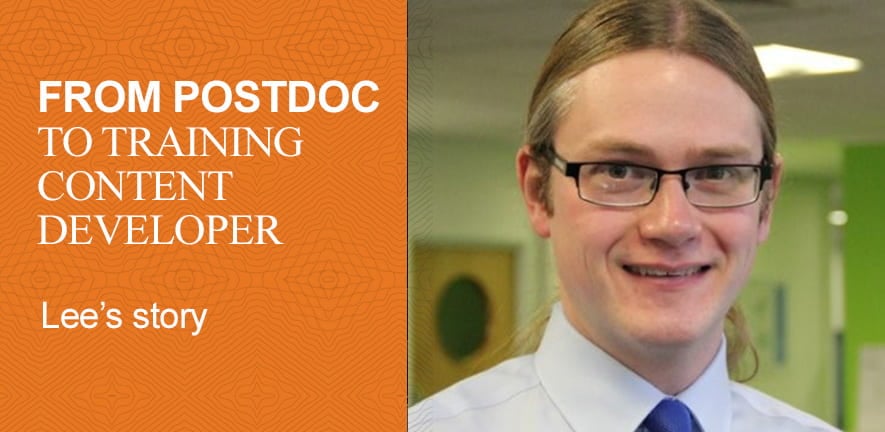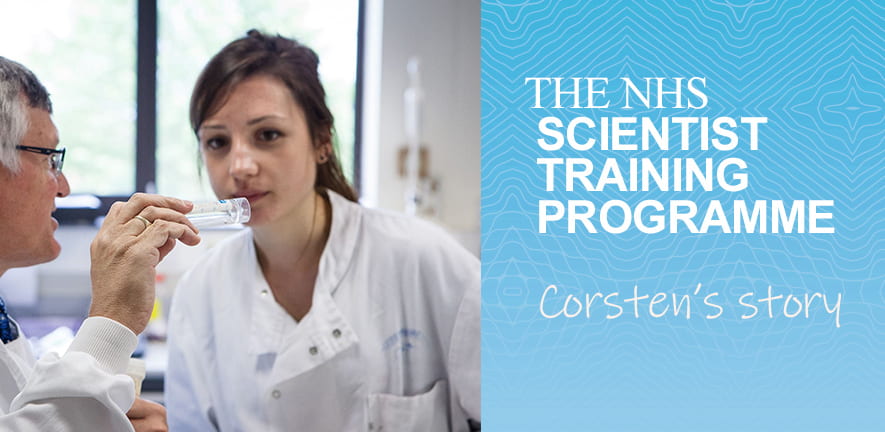
Former postdoc Lee has taken his love of teaching and technology and applied it to a new role as a Technical Training Content Developer. Here, he tells us about the similarities with his academic career, how he appreciates his flexible working hours and how he drives his own career development
Please give us a brief career history
I was lucky enough to study Natural Sciences at Cambridge, eventually specialising in Materials Science, staying for a PhD and submitting my thesis in 2012. I then continued my research journey by moving to France for a postdoc, working in a related area to my PhD. After three years I had produced a reasonable body of work and could have continued, but I felt ready to try something outside of research. I returned to the UK and joined Granta Design, an established Cambridge spin-out, making teaching resources to go with educational software about engineering materials. I still work there, but moved to the part of the company making commercial enterprise software and became their only Technical Training Content Developer. I maintain a library of slides, exercises, videos and other resources that my colleagues use to deliver training to our customers in large engineering companies around the world.
Why were you attracted to this role, how did you find it?
I always enjoyed the teaching side of being an academic – during my PhD I was a supervisor, lab demonstrator, and did quite a few outreach activities. Part of teaching is designing course content: it’s a huge challenge to get your own head around some very technical knowledge, and then to organise it in a way that is easy for someone else to access. In some ways, that challenge is the same whether you’re an academic lecturer or working for a company. That’s what I like most about this job.

Did you explore other career paths?
Always – I’m very indecisive! At every point in my career where I’ve had to make a choice, I’ve looked around at the other options. For example, I considered going straight to the private sector rather than doing a PhD, but I graduated in 2008 when the economy was shaky, so research seemed like a safe haven for a few years, as well as being interesting and exciting. When it came to leaving research in 2015, I evaluated several job adverts and literally wrote out the pros and cons, and gave them all a score. I could have applied for another postdoc in Spain or Finland, but the lure of a permanent job and returning to Cambridge won me over.
What do you do in your current role – what is an ‘average’ day?
My working hours are later than some of my colleagues, so there are a few emails waiting for me when I get in. Someone from the services team is about to deliver training to a large customer who needs to know everything about our product’s security and access control features. I point them to the right resources, and suggest a few ways to tweak their itinerary and alter the content for the users they’ll be dealing with.
Then I get down to the week’s main project – some meaty exercises about how to parse text output from mechanical test machines. I use my allotted learning time to read up on regular expressions, and get to work mocking up some examples that customers might recognise. In the process I find and report a couple of obscure bugs in the software – nothing m ajor, but they’ll be fixed in the next update.
ajor, but they’ll be fixed in the next update.
After lunch I’ve got a meeting with a product manager – they’re excited about their pet project, a new feature to solve a particular customer problem to do with regulatory compliance. I ask the usual questions: who is the audience for a training event on this? What will they know already, and what will they need to learn? They share with me a few case studies and an example project file they were working on, so I can start planning the training content. I won’t do the work on this before next month, but it’s good to think ahead.
In the late afternoon I host one of my regular video conference webinars for existing customers. Quite a few tune in – they say it helps them stay sharp. This month I’ve coached one of my colleagues to be a guest speaker, talking about how to use our product with CAD projects and simulations. I set up a laptop to record their great demonstrations, and tomorrow I’ll edit and publish some clips on our customer-facing archive for anyone who missed it.
What do you enjoy about your job?
As the only training content developer in the building, I’m almost a department unto myself, and I’m largely responsible for organising my own time – I like working this way, it’s not so different from when I was a researcher. I set up meetings and listen to all the stakeholders – like the product managers who oversee the software, and the services consultants who deliver training – to establish what customers need to learn, and what they are struggling with. And as an intensive user of the software myself, I can give the developers a lot of feedback about the product, trying to make the user interface easier to get to grips with. So it’s a varied, communicative and social role that involves regular chats with most people in the company. It all helps me feel like a valued and respected member of the team. I’m not just stuck at my desk churning out slides.
Finally, and quite importantly for me, the company is also flexible about working hours, and I can work part-time (4 days per week) to make time for my other interests. I have a serious hobby – I’m a musician playing with two semi-professional acts that I also co-manage. Staying well-rehearsed while also promoting the acts for paid opportunities like weddings and other functions, well, it takes time and energy!
Any aspects that you don’t enjoy?
You do have to continuously advocate for the importance of your role – some people don’t get how important it is that customers be able to learn about the product in a way that speaks their language and suits them. Recent trends towards online e-learning mean you’ll sometimes use a learning management system (LMS) to deliver the content – some of these are better than others, but they can feel restrictive and there’s definitely a sense of distance from the learner. You can end up doing a lot of the same old thing if you don’t agitate for your own career development – for me that involves talking to my manager about new ways I want to learn and develop myself.
What are the main skills you use on a day-to-day basis?
 It’s a good job for a generalist – I use a lot of different skills. I have to quickly pick up new technical concepts, by reading around or from conversations with colleagues, and move from one task to another. I need good people skills to tease out what stakeholders in a project really want me to do – sometimes they don’t express it very well – and most of all, I have to be very well organised because the job involves keeping a lot of different people happy, and delivering lots of things by different deadlines. Managing my own workload, and pushing early against any sign of an unrealistic deadline, is probably the most important general business skill – it has stopped me making crazy promises and getting stressed trying to follow through on them!
It’s a good job for a generalist – I use a lot of different skills. I have to quickly pick up new technical concepts, by reading around or from conversations with colleagues, and move from one task to another. I need good people skills to tease out what stakeholders in a project really want me to do – sometimes they don’t express it very well – and most of all, I have to be very well organised because the job involves keeping a lot of different people happy, and delivering lots of things by different deadlines. Managing my own workload, and pushing early against any sign of an unrealistic deadline, is probably the most important general business skill – it has stopped me making crazy promises and getting stressed trying to follow through on them!
The Careers Service is amazing. Their Vacancies & Opportunities database has some of the best jobs going
What is your one tip for postdocs who might be considering a move to this sector?
Make sure you ask questions at interview about what the job will really involve. I have the impression that the training role varies a lot from company to company, and you might have the opportunity to define it yourself. Also, try to make sure your prospective manager is someone you think you can work well with. That’s one for any job really, but it’s hard to resolve a personality clash with someone who has power over you.
How did you use the Careers Service in your search?
The Careers Service is amazing: their Vacancies & Opportunities database has some of the best jobs going, and they got me into my current company. Through my years in academia I always kept an eye on it, in case some once-in-a-lifetime position came up. When I was a student, the staff there were always very friendly and open to open-ended discussions when I didn’t know what I was going to do – I never felt railroaded into any particular career. I think they know that everyone is different, and that it’s important to do something for work that matches not just your skills, but your character and values.

 R&D in industry isn’t a surprising postdoc career destination but it’s still surrounded by mystery. What are the reasons former postdocs in industry say that they like it? Or there any downsides they are hiding?
R&D in industry isn’t a surprising postdoc career destination but it’s still surrounded by mystery. What are the reasons former postdocs in industry say that they like it? Or there any downsides they are hiding? Fast turn around time
Fast turn around time
 silience?
silience? Understand why they are asking it
Understand why they are asking it
 Are any of the delegates people you would like to employ you (as a postdoc or PI) or host you (as a fellow)? Reach out to them in advance and try to set up a meeting at the conference. If you are presenting a talk or poster, let them know. A quick chat can be easier and more fruitful than a carefully crafted email, particularly if you are looking to change subfields.
Are any of the delegates people you would like to employ you (as a postdoc or PI) or host you (as a fellow)? Reach out to them in advance and try to set up a meeting at the conference. If you are presenting a talk or poster, let them know. A quick chat can be easier and more fruitful than a carefully crafted email, particularly if you are looking to change subfields.

 hing that has never changed throughout my career is a deep passion for numbers.
hing that has never changed throughout my career is a deep passion for numbers. Many postdocs maintain an online presence through a personal website or their research group’s website.
Many postdocs maintain an online presence through a personal website or their research group’s website.
 A short telephone or Skype interview is frequently used in all sectors – for lectureships and jobs outside academia – as a time and cost-efficient way of meeting candidates and deciding whether to invest in taking them further in to the process. As a result, they tend to be quite broad in scope aiming to assess in some way each of the elements that will be addressed in detail at a later stage.
A short telephone or Skype interview is frequently used in all sectors – for lectureships and jobs outside academia – as a time and cost-efficient way of meeting candidates and deciding whether to invest in taking them further in to the process. As a result, they tend to be quite broad in scope aiming to assess in some way each of the elements that will be addressed in detail at a later stage.